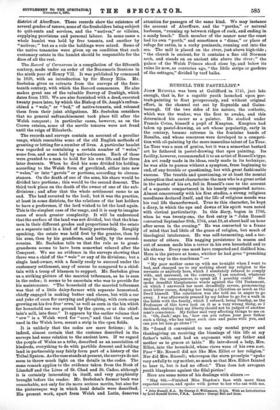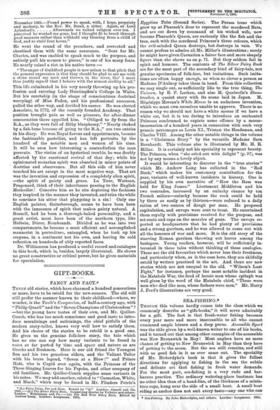RUSSELL THE PASTELLIST.*
JOHN RUSSELL was born at Guildford in 1745, just late enough, that is, for a capable youth launched upon por-
trait-painting to float prosperously, and without original effort, in the channel cut out by Reynolds and Gains- borough. Of the two sides of his nature, the aesthetic, which was the weaker, was the first to awake, and this determined his career as a painter. He studied under Francis Cotes, himself a pupil of Knapton. Knapton had taken up pastel-drawing, an art whose popularity, early in the century, became extreme in the feminine hands of Rosalba, and whose resources were developed to a competi- tion with oil-painting by the more masculine talent of La Tour. La Tour was a man of genius, but it was a somewhat bastard art he fathered in pastel-drawing that apes painting. Its facility, however, recommended it to an artist of Russell's type. An art ready made in its ideas, ready made in its technique, he was able to pursue without a symptom, from beginning to end, of any trouble or questioning, but with great fashionable success. The trouble and questioning, or at least the mental absorption that must characterise the man who is a great artist in the matter of his art, fell in Russell's case to the account of a separate compartment in his loosely compacted nature. Almost concurrently with his first studies, a strong religious moodiness declared itself, and the life of religious moods was his real life thenceforward. True to this character, he kept a diary, in which the ups and downs of his spirit were noted with clerical particularity. In this diary, begun in 1766, when he was twenty-one, the first entry is " John Russell converted September 30th, 1764, mtat 19, at about half an hour after seven in the evening." He was converted to a frame of mind that had little of the grace of religion, but much of theological intolerance. He was self-tormenting, and a tor- menter of others. His nagging persistence in season and out of season made him a terror in his own household and to his sitters. Every one must have respected and disliked him.
Here is the picture at home, whither he had gone "preaching all the way to the coachman " :—
" My poor mother came up with me to-night when I went to bed, and charged me to say nothing about my religion to the servants or anybody here, which I absolutely refused to comply with, and answered, on the contrary, am resolved, whatever may be the consequences, to speak all I possibly could.' She spoke dreadful blasphemous words against the Old Testament, on which I answered her most dreadfully severe, pronouncing most bitter curses, denying her being a Christian as much as the Devil himself. The conclusion was she told me in anger to go away. I was afterwards pressed by my father to go for a walk in the fields with the family, which I refused, being Sunday, as the Professors of this town look on it as a very wrong thing, so I declined, stating that my liberty should not be judged of another man's conscience. My father said very affecting things to me on it. Oh, Jack,' says he, how can you refuse your poor father such a thing, who has taken such care and pains with you, and can you let him go alone ? ' "
He "found it convenient to use only mental prayer and thanksgiving on receiving the blessings of this life at my father's table, and had an argument with my father and mother as to graces at table." He introduced a lady, Mrs.
Elliot, into the household, whose views were of his own sort. Poor "Mr. Russell did not like Mrs. Elliot or her religion."
Nor did Mrs. Russell; whereupon the stern proselyte "spoke very awfully to my mother, so much so that Mrs. Elliot fainted to hear it, but it had no effect." Thus does hot arrogant youth blaspheme against the filial pieties !
Here are some notes of his dealings with sitters :—
" May 8th.—Finished Miss Haydon's face with more than expected success, and spoke with power to her who sat with me.
• John Russell, R.A. By George C. Williamson, D.Lit. With an Introduction by Lord Ronald Gower, F.S.A. London: George Bell and Sons. November 19th.—Found power to speak, with, I hope, propriety and modesty, to the Rev. Mr. Bund, a sitter. Again, at Lord
Aylesford's Afterwards we talked religion over tea. I perceived he wanted me gone, but I thought fit to break through good manners rather than withhold any blessing from a child of God, and so staid four hours."
He went the round of the preachers, and corrected and chastised them with the same assurance. "Sent for Mr.
Charles, and was enabled to speak much to the purpose, and entirely pull his sermon to pieces," is one of his many feats. He nearly raised a riot in his native town :—
" The anger of Guildford people is now arisen to that pitch that the general expression is that they should be glad to see me with a stone round my neck and thrown in the river, tho' I must thus justify myself that I behave with the utmost civility to all."
This life culminated in his very nearly throwing up his pro- fession and entering Lady Huntingdon's College in Wales. But his courtship (in the shape of conscientious doctrinal worrying) of Miss Faden, and his professional successes, pulled the other way, and decided his career. He was elected Associate, in 1772, of the recently founded Academy. That position brought pain as well as pleasure, for after-dinner conversation there appalled him. " Obliged to fly from the RA., as they were full of filthy blasphemy," "Nearly choked by a fish-bone because of going to the B.A.," are two entries in his diary. He won Royal favour and appointments, became the fashionable pastellist, and has left portraits by the hundred of the notable men and women of his time. It will be seen how interesting a contradiction the man presents. The victim of an hysterical trouble, he was doubly affected by the emotional revival of that day; while his opinionated sectarian spirit was absorbed in minor points of doctrine and observance. But all this aide of him never touched his art except in the most negative way. That art was the invention and expression of a completely alien spirit, —the spirit of gaiety and grace. La Tour, Watteau, Fragonard, think of their inheritance passing to the English Methodist! Conceive him as he site depicting the fashions they inspired in the manner they invented, and tries the while to convince his sitter that playgoing is a sin ! Only one English painter, Gainsborough, seems to have been born with the innocence of spirit that makes gaiety natural. A Russell, had he been a thorough-baked personality, and a great artist, must have been of the northern type, like Holbein, Diirer, Rembrandt. Divided as he was into two compartments, he became a most efficient and accomplished mannerist in portraiture, entangled, when he took up his crayons, in a sentiment not his own, and leaving its cold reflection on hundreds of ably reported faces.
Dr. Williamson has produced a useful record and catalogue in this book, which is, besides, largely illustrated. He shows no great constructive or critical power, but he gives materials for speculation.



















































 Previous page
Previous page